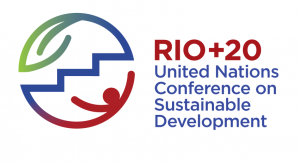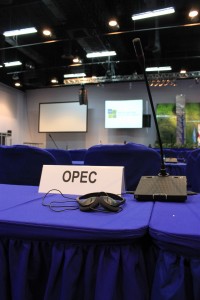Earth Negotiations in 2012 - Asking the Fox to Guard the Henhouse!
Just a month after the conclusion of the COP17 and its “historic” adoption of the Durban Platform, the climate community is now shifting its focus from evaluating what states have finally agreed in Durban (or failed to agree upon) towards envisioning opportunities for the coming year.
What to expect from 2012?
 There is no denying that 2012 already hold many promises as a particularly intense year in terms of earth negotiations. During the next six months, the process leading to the Rio+20 conference will accelerate, with an increasing amount of informal meetings and negotiating sessions.
There is no denying that 2012 already hold many promises as a particularly intense year in terms of earth negotiations. During the next six months, the process leading to the Rio+20 conference will accelerate, with an increasing amount of informal meetings and negotiating sessions.
In the run-up to Rio, the UNFCCC will also host its most intense intersessional session ever (in terms of the number of bodies meeting at the same time). During two weeks in late spring, the climate negotiations community will meet in Bonn, with 5 major negotiating tracks and subsidiary bodies meeting at the same time (for those addicted to acronyms, the June meeting will gather sessions of the SBI, the SBSTA, the AWG-KP, the AWG-LCA and the newly created AWG-DPEA - Working Group on the Durban Platform for Enhanced Action).
Among the daunting tasks awaiting the negotiators, one can already foresee as particularly challenging the following three elements: the launch of a renewed negotiating round towards a post-Kyoto agreement, the adoption of a second commitment period of the Kyoto Protocol, and the opening of serious thinking on how to fill in the Green Climate Fund.
With negotiators having some much on their plate, who are they trusting to lead the cuisine?
 The importance for the success of the negotiations of the presiding officers has been demonstrated over the past years: while the Danish leadership was blamed unanimously for the failure of the Copenhagen 15, the positive role played by the Mexican presidency in the lead to the unexpected progresses achieved in Cancun was almost as unanimously acknowledged.
The importance for the success of the negotiations of the presiding officers has been demonstrated over the past years: while the Danish leadership was blamed unanimously for the failure of the Copenhagen 15, the positive role played by the Mexican presidency in the lead to the unexpected progresses achieved in Cancun was almost as unanimously acknowledged.
This year, one negotiating block seems to have been particularly successful at securing leadership positions in the negotiations for its members… You would expect that, realizing the urgency and inequity aspects of the climate crises, the international community has decided to give a stronger role to those speaking on behalf of the small islands threatened by sea level rise, or perhaps to Sub-Saharan countries already affected by an increasing severe climate.
I am afraid however that leadership has however taken this year a whole different direction. Qatar has been selected to host the upcoming COP18 and preside the negotiations for twelve months. Qatar, a member of the OPEC - the club of oil exporters - has the highest emissions of greenhouse gases per capita in the world. Each year and on a per capita basis, Qatar puts into the atmosphere as much as three times the emissions of the average US citizen (not quite an example him/herself), or 10 times as much as the world’s average.
 As COP president, Qatar will build on the support and leadership of other presiding officers, and more particularly on the skills and commitment of the chair of the AWG-LCA (the negotiating body looking into some of the key upcoming issues). One can be sure already that Qatar will indeed find there a comfortable support as a gentleman from Saudi Arabia - the bugbear of the environmental NGOs - has been chosen for this strategic post.
As COP president, Qatar will build on the support and leadership of other presiding officers, and more particularly on the skills and commitment of the chair of the AWG-LCA (the negotiating body looking into some of the key upcoming issues). One can be sure already that Qatar will indeed find there a comfortable support as a gentleman from Saudi Arabia - the bugbear of the environmental NGOs - has been chosen for this strategic post.
This unlikely presiding duo is likely to find a receptive ear among the G77-China (representing no less than 131 countries), as the country chairing the group this year is a third OPEC member: Algeria, thus now occupying a position that is not only relevant to the climate negotiations but also to the Rio+20 process.
If one needed icing on the cake, we could also note that the current chair of the Asia Group in the climate talks is no other than… Saudi Arabia. Being the chair of a regional group comes with competences enabling a certain amount of nuisance capacity, would the country decide to utilize its position in a way as to obstruct progress. This later position might hopefully still change soon.
The climate process – a rehabilitation led by the chief dealers?
I am left with a question to the climate negotiators: have you completely given up on achieving anything substantial in these negotiations this year? Or would you rather expect those profiting from our current dependency to fossil fuels to lead us away from this dangerous addiction? Or is this just a practical joke? If so, why not push the fun till the end: I suggest nominating Canada to chair the discussions on the future of the Kyoto Protocol, while the country is the only one having withdrawn from this agreement.
Well, in a desperate attempt to see some positive light in the beginning of the year and to retain some optimism, we can still hope that this position will put the OPEC members under more public scrutiny so that they would not dare to scupper the climate negotiations. Or perhaps that these leading positions will enable the oil exporters to realize that their resources have no promising future and they would rather benefit from the anticipation of the transition to new sources of energy. But this, I am afraid, is wishful thinking.
Images: Sébastien Duyck,
Marc Aert / FreeDigitalPhotos.net




About the author
Sébastien Duyck
Passionate environmental advocate, PhD student (Human Rights and Environmental Governance). Following particularly UNFCCC, UNEP and Rio+20 processes
